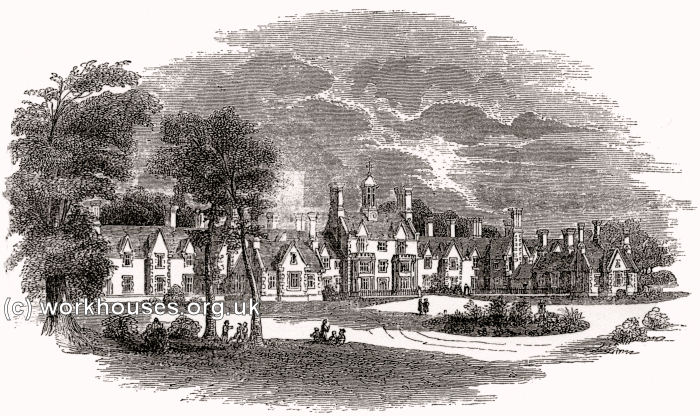Two Hours at a Union Workhouse
In October 1841, The Penny Magazine carried an article entitled "Two Hours at a Union Workhouse", the Union in question being Windsor. At a time when the workhouses established under the New Poor Law were receiving considerable criticism as a being harsh and cruel institutions, the article has a largely positive tone.

Windsor workhouse from the east, 1841.
© Peter Higginbotham.
TWO HOURS AT A UNION WORKHOUSE.
The name which some persons have attempted to fix upon the Workhouses of the Unions formed under the New Poor-Law is Bastile. The Bastile, as our readers know, was the state prison of Paris. It consisted of eight towers, united by masonry of great thickness. This building was surrounded with a fosse, or ditch, one hundred and twenty feet wide, and twenty-five feet deep; and beyond the ditch was a stone wall, thirty-six feet high. The eight towers contained several stories of octagonal rooms, each having a loopholed window, unglazed, pierced through a wall six feet thick. There was no chimney or fireplace in the rooms; and the only furniture was an iron grating, raised about six inches above the floor, on which the mattress of the prisoner was placed, and on this grating he slept by night and sat by day. The Union Bastiles are somewhat differently constructed. The engraving at the head of this paper is an accurate representation of the Workhouse erected for the Windsor Union. It is situated in the parish of Old Windsor, on the verge of the Great Park, at a spot known as Bear's Rails. The road which passes it leads to Bishopgate and Englefield Green, where the stranger finds himself amongst the beautiful scenery with which the neighbourhood of Windsor abounds, particularly in this locality, which is the scene of Denham's celebrated poem of 'Cooper's Hill.' The Union Workhouse harmonizes with the cheerful peeps over the valley of the Thames, and the massive and venerable trees which form the charm of these woodland solitudes. It is built in the style of two centuries and a half ago, when comfort and elegance, the growth of security, had displaced the rude fortress-mansions of the feudal lords. The area which surrounds it is separated from the public road only by light palings. The court before the central building is bright with flowers and green turf; and the well-directed industry of the inmates is rapidly converting two large plots of waste land, above and below the building, into profitable kitchen gardens. But let us enter.
At the central door we are met by a porter, who communicates to the master of the workhouse our wish to see the building. We are shown into a neat room (that on the right of the door); the opposite room is the master's office. The inmates have recently dined. We taste the food which has constituted their meal; and we acknowledge that the suet pudding, the bread, and the cheese are, in quality, equal to what may be found in the larders of the wealthiest. But then the quantity? How many poor children get up hungry from this scanty meal? How many aged persons want some comforts besides soup, and gruel, and pudding, and boiled beef? We have been taught, very industriously, to think that there is a pinching dietary in these workhouses; and though the food is unquestionably good, is there enough of it? Such thoughts must cross the mind of the stranger who has heard of anti-poor-law orators and writers. The sight of this building has dispelled some of his prejudices; and he can no longer begin his apostrophe to the miseries of a Union Workhouse with Eloise's lamentation,
"Relentless walls! whose darksome round contains,"
&c., &c. But there may still be a great deal of misery though the rooms are cheerful, light, airy, clean even to a Dutch housewife's cleanliness. Let us proceed. The men's dining-rooms on the left of the centre are empty. We go onward to their sitting-rooms, which communicate with yards or courts, in front and behind. The men are separated into two classes — the able-bodied, and the aged and infirm; and each have their allotted stations. The old and infirm are quietly sitting after their meal, — some in the bright sunshine, some in their ward. A few are reading. The able bodied (at this season a small number) have gone to their allotted work, either in the garden, or in picking oakum, or in cleaving wood, or, if they practise any trade of general utility, such as that of the tailor or shoemaker, in labouring for the common benefit. The boys are with the schoolmaster. We see here a healthy set of lads, well clothed, perfectly clean, with smiling and assured faces, learning to read, to write, to cipher, under the direction of an intelligent young man, who looks, in the performance of his duty, as active and cheerful as the boys themselves. We proceed up stairs to the sleeping-rooms. The whole upper range of the building, which is about three hundred and sixty feet long, is a series of rooms, accessible by several staircases, but communicating, in their entire length, with the master's and matron's apartments in the centre. These rooms, as the lower rooms, are subdivided into the bed-rooms of the able-bodied men, the aged, the infirm, and the boys. On the opposite side of the central building are the sleeping-rooms of the aged and infirm women, the able-bodied, and the girls. Throughout the entire range each has a separate bed; and in looking at these beds (and we were invited to a careful examination of them), it is impossible to doubt that the most vigilant cleanliness presides over the establishment. The ventilation of these sleeping-rooms is perfect. Upon descending into the ground-floor on the right of the centre, we are in the female day-apartments. These are upon the same plan as those of the males. The old women who are not infirm are comfortably seated at their knitting and sewing; some are reading the Book of Life, — that best consolation under every condition; some are walking in their sunny court, and perhaps the thought of their tea (for they have tea) is a pleasant anticipation. The girls are with the schoolmistress. They are learning to knit, to sew, to read, and to write. All can now write. A year ago, when the Union was first opened, scarcely any could write. An intelligent girl or boy, who desires to know something more than is to be found in the school-books, may have a book out of the library, and so may the adults.
We have seen nothing yet of actual misery; we have scarcely observed a face in which there is a lurking discontent. The food, though not luxurious or improvidently distributed, must be abundant; for we have beheld nothing but health. We know that health is dependent upon cleanliness, ventilation, and sufficient food. Here are undoubtedly cleanliness and ventilation; and the food must be ample for the purposes of health, or there would be sickness. But there is an infirmary to be seen. Here, indeed, there is some wretchedness, but it is that suffering which we find in the wards of a well-conducted hospital. The sufferer has come here for relief. Here is the paralytic, whose continued abiding amongst us must be rendered as little burdensome as may be; here is the cripple, who is incapable of labour or of exercise, and his pains must be soothed under the eye of surgical skill; here is one who lost the use of his limbs in the last hard winter, and he is fast recovering his strength and his ability to work. The patients tell us that every comfort which they require is within their reach; that every nourishment or even indulgence which they want is instantly given, upon the order of the medical officer. We are satisfied that the sick are well cared for. The kitchen, the laundry, and the chapel complete the inspection of the building.
Is the Workhouse of a Union, then, in which the physical condition of the poor is so much better looked after than in their own dwellings, a place which the poor will desire to pass their days in? Assuredly not. If it were so, it would be a greater curse to the community than the filth, the ignorance, the vice, the suffering of the old parochial workhouses, where the only thing which the parish officers required was that the poor should be fed. To the able-bodied the most comfortable Union Workhouse must be an irksome place. Its strict classification, its regulated supply of food, its unvarying uniformity of discipline, its enforcement of labour, its seclusion from the rest of the world, must offer restraints which few would encounter who have the means of earning their own living. The dirty vagabond who occasionally demands the shelter and food which are offered to all, even the non-parochial wayfarer, likes not the cleanliness and order which must accompany the satisfaction of his physical necessities. He abides not here. But to the worn-out solitary man, and the sick, — the orphan, and widow, the Union Workhouse must be an incalculable blessing. The education of the children of these Bastiles will raise the standard of intellect and morals in the whole community. Such workhouses as we have thus hastily noticed must realize the true object of such institutions — "not to repel the really destitute, nor to attract those who have any other lawful means of procuring subsistence."
Unless otherwise indicated, this page () is copyright Peter Higginbotham. Contents may not be reproduced without permission.



